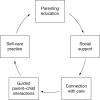Mental health in primary care for adolescent parents
- PMID: 23277797
- PMCID: PMC3487608
Mental health in primary care for adolescent parents
Abstract
Mental health care is important for everyone, especially teenagers. However, seeking mental health services may be challenging for teenagers, particularly when they are also parents. Offering mental health care in a safe, attractive and easily accessible manner, such as primary care, increases the chances that teenage parents will receive help. Comprehensive care models need to be established to address the many needs that at-risk young mothers and their children face. There are a number of programmes available to teenage mothers that either address healthcare and psychosocial needs or focus primarily on improvements in parenting skills; yet an integrated model that delivers medical, psychiatric and psychosocial care and facilitates positive parenting skills seems to be missing. Through a university-community partnership we have recently developed a model curriculum - the Mom Power (MP) group programme - at the University of Michigan which aims to close this gap in service delivery. We elaborate on core elements and key features of this 10-week group intervention programme for high-risk teenage mothers and their children, and present preliminary outcomes data. Analyses on the first 24 MP group graduates suggest that despite ongoing life trauma during the intervention period, teenage mothers show improvements in depression and post-traumatic stress disorder symptoms post intervention, and also self-rate as less guilty and shameful regarding their parenting skills after programme completion. Although preliminary, due to design and statistical limitations, these results show promise regarding feasibility and effectiveness of this integrated approach for teenage mothers with young children delivered through primary care.
Keywords: adolescent mental health; intervention; primary care; teenage mothers.
Figures
References
-
- Costello EF, Foley DL, Angold A. 10 year research update review: the epidemiology of child and adolescent psychiatric disorders: II. Developmental epidemiology. Journal of the American Academy of Child Adolescent Psychiatry 2006;45(1):8–25 - PubMed
-
- Patel VFA, Hetrick S, McGorry P. Mental health of young people: a global public-health challenge. The Lancet 2007;369(9569):1302–13 - PubMed
-
- Danielson S. Assessment of Services and Proposed Interventions for Pregnant Women in Keene, New Hampshire (PhD dissertation) Antioch University; Unpublished, 2008
-
- Sarri R. Health and social services for pregnant and parenting high risk teens. Children and Youth Services Review 2004;26:537–60
-
- Akinambi LJ, Cheng TL, Kornfeld D. A review of teen-tot programs: comprehensive clinical care for young parents and their children. Adolescence 2001;36(142):381–93 - PubMed
LinkOut - more resources
Full Text Sources
Miscellaneous



